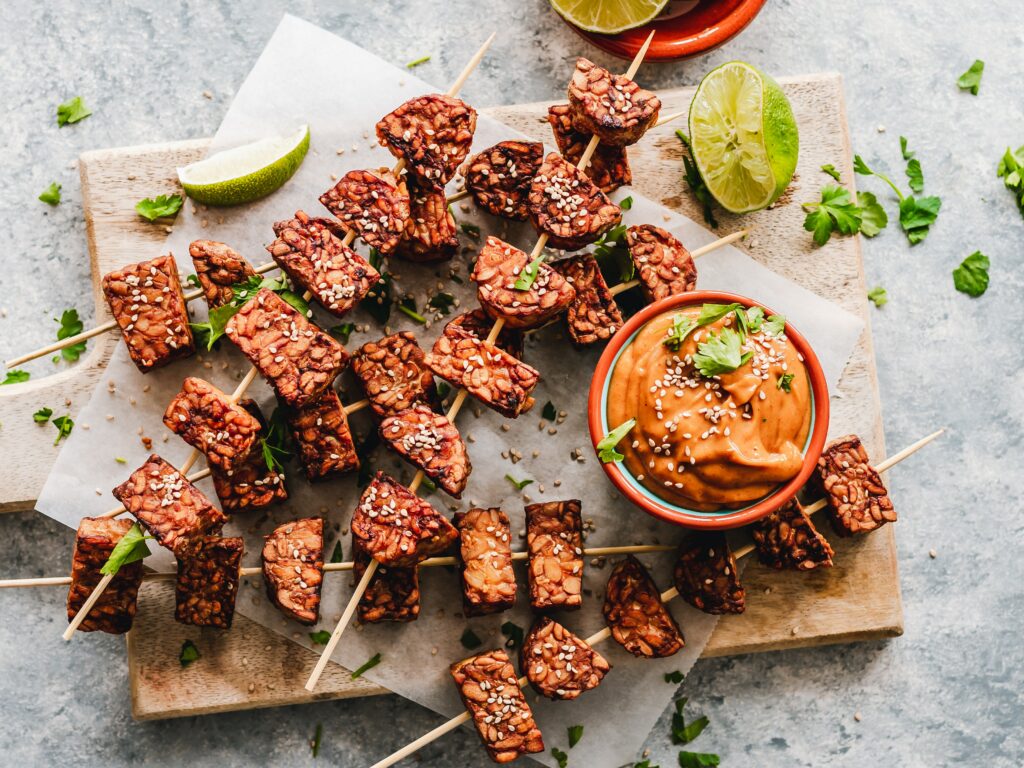Tofu burger, lentil stew or a beef filet after all? By now, most people probably know that our eating habits have a major impact on our carbon footprint and thus on the climate. Since the ecological footprint of meat is particularly large, more and more people want to reduce their meat consumption. And now what? Eat only side dishes? Far from it!
The choice of meat substitutes and plant-based alternatives on restaurant and supermarket menus has never been greater. Whether you’re giving up meat for ethical, environmental or health reasons, there are now plenty of alternatives to suit every taste. So it’ s about time we take a closer look at some plant-based products and take a glimpse into the future of sustainable nutrition.
Meat substitutes from plant-based products
If you want to forgo meat and grill something with a higher protein content in addition to vegetables at the upcoming barbecue party, there are now countless meat substitutes available. Plant-based substitutes perform best in terms of eco-balance. The reason for this is that plant-based products can be consumed directly, whereas meat requires an additional step in between as plants are first used as animal feed, for example. If you compare a kilo of soy-based meat substitute (2.8 kg of greenhouse gases) with a kilo of beef (30.5 kg of greenhouse gases), it quickly becomes clear that it makes sense to avoid meat in a climate-friendly diet. In addition to tofu, there are countless other plant-based foods that can be prepared in a variety of ways and with which you can impress your guests as a gourmet chef. We present a few healthy, versatile and above all climate-friendly products.
Tempeh
Anyone who knows Indonesian cuisine is certainly familiar with tempeh. Tempeh is a traditional soy product made from fermented soybeans. Tempeh has a nutty taste and can directly absorb the flavor of a sauce or food with which it is mixed. For this reason, tempeh is excellent for making vegetarian kebabs for the next barbecue, for example. In addition, the soy product has a positive effect on the immune system. All that with the positive side effect of keeping the burden on the climate as low as possible.
Lupins
Anyone who values not only a climate-friendly diet, but also a diet rich in protein, should definitely include lupins in their diet. With a protein content of around 40%, lupin seeds are among the protein-rich legumes and contain many healthy minerals on top of that. Lupins are suitable for dips, salads or as an alternative to chips, among other things, and are considered the meat substitute of the future due to their highly sustainable and easy-to-grow properties. Here, too, it is worth looking at the origin of the products, as lupins are now also grown in Europe and Switzerland.

Seitan
Seitan also comes from the Asian region and has been part of Japanese cuisine for years. Seitan is wheat flour in which all the starch is flushed out, giving it a meat-like consistency. This gives it a meat-like consistency. In terms of taste, seitan is not particularly surprising on its own, which is why it is highly recommended to season it during preparation. Alternatively, there are countless marinated seitan products available in supermarkets and health food stores that are ideal as meat substitutes. Although the eco-balance of seitan is slightly worse compared to tofu, it is still far better than meat. Tip: When buying, look for organic quality and origin. Although seitan, tempeh and tofu originated in Asia, there are plenty of manufacturers in Europe by now.
Peas
Another option for a meat-free diet is meat substitutes made from peas. Similar to lupins, peas are rich in proteins as well as amino acids. Due to the large amount of iron, B vitamins and magnesium, they are also good for your health. Since peas have a good bite, these products can rival meat in terms of texture and fiber. An example of this are the Planted products, which are manufactured and distributed in Switzerland. Whether it’s kebabs, chicken or pulled pork, the range of products is wide and offers something suitable for every occasion.
Jackfruit

 Anyone who has ever eaten jackfruit knows that the consistency is very similar to that of meat due to fibrous texture. This meat substitute can also be found mainly in Asian supermarkets and comes from the jackfruit tree. Jackfruit is the largest tree fruit in the world and is suitable, for example, for preparing meatless burgers, curries and stews. Similar to seitan, this product tastes rather neutral, which is why it should be well seasoned during preparation. Since the fruit comes from the tropics, the ecological footprint is larger compared to tofu, tempeh, lupins or seitan, but still many times better than that of eating meat.
Anyone who has ever eaten jackfruit knows that the consistency is very similar to that of meat due to fibrous texture. This meat substitute can also be found mainly in Asian supermarkets and comes from the jackfruit tree. Jackfruit is the largest tree fruit in the world and is suitable, for example, for preparing meatless burgers, curries and stews. Similar to seitan, this product tastes rather neutral, which is why it should be well seasoned during preparation. Since the fruit comes from the tropics, the ecological footprint is larger compared to tofu, tempeh, lupins or seitan, but still many times better than that of eating meat.
A glimpse into the future: Lab-grown meat?
Have you ever heard of lab-grown or in-vitro meat? For several years, scientists have been researching and experimenting to see if it is possible to grow meat in the laboratory. This is done by taking stem cells from animals, cultivating them into muscle cells and then growing them. Science is at the beginning of a new field of research here, which is why it is still difficult to say how much more climate-friendly lab-grown meat really is compared to conventional meat. What is clear, however, is that much less space is needed to produce meat in the lab than in livestock farming, and a meat-like consistency can still be produced. All of this without animals suffering in the production process.
The next time you have dinner with friends or family, it’s worth trying one of these plant-based foods. You can find countless recipe ideas and marinades on the Internet. There are no limits to your creativity. Not only is it fun to try something new in the kitchen, but at the same time you are helping to protect the climate. We wish you a lot of fun while cooking!

Article by Lorena Oberlin.

 Deutsch
Deutsch Français
Français Italiano
Italiano
